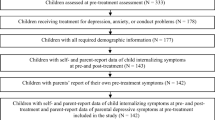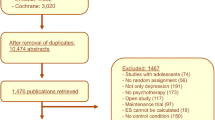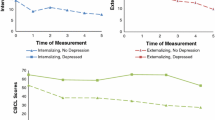Abstract
Child depression is an impairing condition for which psychotherapies have shown modest effects. Parental depression is a risk factor for development of child depression and might also be negatively associated with child depression treatment outcomes. To explore this possibility, we analyzed data from a study in which children were treated for depression after parental depressive symptoms had been assessed at baseline. Among children treated for depression in a randomized controlled trial, we identified 31 who had child- and parent-report pre- and post-treatment data on child symptoms and parent-report of pre-treatment parental depressive symptoms. Children were aged 8–13, 77% boys, and 52% Caucasian, 13% African-American, 6% Latino, and 29% multi-racial. Analyses focused on differences in trajectories of change (across weekly measurements), and post-treatment symptoms among children whose parents did (n = 12) versus did not (n = 19) have elevated depressive symptoms at baseline. Growth curve analyses showed markedly different trajectories of change for the two groups, by both child-report (p = 0.03) and parent-report (p = 0.03) measures: children of parents with less severe depression showed steep symptom declines, but children of parents with more severe depression showed flat trajectories with little change in symptoms over time. ANCOVAs showed lower post-treatment child symptoms for children of parents with less severe depression versus parents with more severe depression (p = 0.05 by child report, p = 0.01 by parent report). Parental depressive symptoms predict child symptom trajectories and poorer child treatment response, and may need to be addressed in treatment.


Similar content being viewed by others
Notes
Analysis of child-reported internalizing symptoms using the Anxious/Depressed scale of the YSR revealed that child symptom levels were significantly lower at post-treatment for children of parents without elevated depressive symptoms (M = 50.89, SD = 2.42) than children of parents with elevated depressive symptoms (M = 56.17, SD = 6.26), F(1,28) = 9.08, p = 0.01, controlling for pre-treatment scores on the Anxious/Depressed scale. Analysis of child-reported internalizing symptoms using the Withdrawn/Depressed scale of the YSR showed that child symptom levels were in the predicted direction, albeit not significantly different at post-treatment for children of parents without elevated depressive symptoms (M = 53.37, SD = 5.33) than children of parents with elevated depressive symptoms (M = 56.75, SD = 7.78), F(1,28) = .81, p = 0.38.
Analysis of parent-reported child internalizing symptoms using the Anxious/Depressed scale of the CBCL showed a significant difference in the predicted direction. Child symptom levels were lower at post-treatment for children of parents without elevated depressive symptoms (M = 55.37, SD = 5.89) than children of parents who had elevated depressive symptoms (M = 63.50, SD = 8.85), F(1,28) = 10.09, p < 0.01, controlling for pre-treatment scores on the Anxious/Depressed scale. Analysis of parent-reported internalizing symptoms using the Withdrawn/Depressed scale of the CBCL revealed that child symptom levels were in the predicted direction at post-treatment for children of parents without elevated depressive symptoms (M = 57.79, SD = 7.57) than children of parents with elevated depressive symptoms (M = 62.17, SD = 9.17), F(1,28) = 3.19, p = 0.09.
References
Achenbach, T. M., & Rescorla, L. A. (2001). Manual for the ASEBA school-age forms & profiles: An integrated system of multi-informant assessment. Burlington: University of Vermont, Center for Children, Youth, and Families.
American Academy of Child and Adolescent Psychiatry. (2007). Practice parameters for the assessment and treatment of children and adolescents with depressive disorders. Journal of the American Academy of Child and Adolescent Psychiatry, 46, 1503–1526.
Batten, L. A., Hernandez, M., Pilowsky, D. J., Stewart, J. W., Blier, P., Flament, M. F., ... & Weissman, M. M. (2012). Children of treatment-seeking depressed mothers: A comparison with the Sequenced Treatment Alternatives to Relieve Depression (STARD) Child Study. Journal of the American Academy of Child & Adolescent Psychiatry, 51, 1185–1196. doi:10.1016/j.jaac.2012.08.020.
Beardslee, W. R., Brent, D. A., Weersing, V. R., Clarke, G. N., Porta, G., Hollon, S. D., ... & Garber, J. (2013). Prevention of depression in at-risk adolescents: Longer-term effects. JAMA Psychiatry, 70, 1161-1170. doi:10.1001/jamapsychiatry.2013.295.
Beardslee, W. R., Versage, E. M., & Gladstone, T. R. G. (1998). Children of affectively ill parents: A review of the past 10 years. Journal of the American Academy of Child and Adolescent Psychiatry, 37, 1134–1141. doi:10.1097/00004583-199811000-00012.
Berg-Nielsen, T. S., Vikan, A., & Dahl, A. A. (2002). Parenting related to child and parental psychopathology: A descriptive review of the literature. Clinical Child Psychology and Psychiatry, 7, 529–552.
Berman, S. L., Weems, C. F., Silverman, W. K., & Kurtines, W. M. (2000). Predictors of outcome in exposure-based cognitive and behavioral treatments for phobic and anxiety disorders in children. Behavior Therapy, 31, 713–731. doi:10.1016/S0005-7894(00)80040-4.
Brent, D. A., Kolko, D. J., Birmaher, B., Baugher, M., Bridge, J., Roth, C., & Holder, D. (1998). Predictors of treatment efficacy in a clinical trial of three psychosocial treatments for adolescent depression. Journal of the American Academy of Child and Adolescent Psychiatry, 37, 906–914.
Bryk, A. S., & Raudenbush, S. W. (1987). Application of hierarchical linear models to assessing change. Psychological Bulletin, 101, 147–158. doi:10.1037/0033-2909.101.1.147.
Cantwell, D. P., Lewinsohn, P. M., Rohde, P., & Seeley, J. R. (1997). Correspondence between adolescent report and parent report of psychiatric diagnostic data. Journal of the American Academy of Child and Adolescent Psychiatry, 36, 610–619. doi:10.1097/00004583-199705000-00011.
Chorpita, B. F., Reise, S., Weisz, J. R., Grubbs, K., Becker, K. D., & Krull, J. L. (2010). Evaluation of the brief problem checklist: Child and caregiver interviews to measure clinical progress. Journal of Consulting and Clinical Psychology, 78, 526–536. doi:10.1037/a0019602.
Chorpita, B. F., & Weisz, J. (2009). Modular approach to therapy for children with anxiety, depression, trauma, or conduct problems (MATCH-ADTC). Satellite Beach: PracticeWise, LLC.
Clarke, G. N., Hawkins, W., Murphy, M., & Sheeber, L. B. (1995). Targeted prevention of unipolar depressive disorder in an at-risk sample of high school adolescents: A randomized trial of group cognitive intervention. Journal of the American Academy of Child and Adolescent Psychiatry, 34, 312–321. doi:10.1097/00004583-199503000-00016.
Clarke, G. N., Hornbrook, M., Lynch, F., Polen, M., Gale, J., Beardslee, W., ... & Seeley, J. (2001). A randomized trial of a group cognitive intervention for preventing depression in adolescent offspring of depressed parents. Archives of General Psychiatry, 58, 1127–1134. doi:10.1001/archpsyc.58.12.1127.
Cummings, E. M., & Davies, P. T. (1994). Maternal depression and child development. Child Psychology and Psychiatry and Allied Disciplines, 35, 73–112. doi:10.1111/j.1469-7610.1994.tb01133.x.
De Los Reyes, A., & Kazdin, A. E. (2005). Informant discrepancies in the assessment of childhood psychopathology: A critical review, theoretical framework, and recommendations for further study. Psychological Bulletin, 131, 483–509. doi:10.1037/0033-2909.131.4.483.
Derogatis, L. R. (1993). Brief symptom inventory: Administration, scoring, and procedures manual. Minneapolis: National Computer Systems.
Eckshtain, D., & Gaynor, S. T. (2012). Combining individual cognitive behaviour therapy and caregiver–child sessions for childhood depression: An open trial. Clinical Child Psychology and Psychiatry, 17, 266–283. doi:10.1177/1359104511404316.
Eckshtain, D., & Gaynor, S. T. (2013). Combined individual cognitive behavior therapy and parent training for childhood depression: 2- to 3-year follow-up. Child and Family Behavior Therapy, 35, 132–143. doi:10.1080/07317107.2013.789362.
Epkins, C. C. (1996). Parent ratings of children's depression, anxiety, and aggression: A cross-sample analysis of agreement and differences with child and teacher ratings. Journal of Clinical Psychology, 52, 599–608. doi:10.1002/(sici)1097-4679(199611)52:6<599::aid-jclp1>3.0.co;2-g.
Garber, J., Clarke, G. N., Weersing, V. R., Beardslee, W. R., Brent, D. A., Gladstone, T. R. G., ... & Iyengar, S. (2009). Prevention of depression in at-risk adolescents: A randomized controlled trial. JAMA: Journal of the American Medical Association, 301, 2215–2224.
Garber, J., Van Slyke, D. A., & Walker, L. S. (1998). Concordance between mothers’ and children's reports of somatic and emotional symptoms in patients with recurrent abdominal pain or emotional disorders. Journal of Abnormal Child Psychology, 26, 381–391. doi:10.1023/a:1021955907190.
Goodman, S. H., & Gotlib, I. H. (1999). Risk for psychopathology in the children of depressed mothers: A developmental model for understanding mechanisms of transmission. Psychological Review, 106, 458–490. doi:10.1037/0033-295x.106.3.458.
Goodman, S. H., Rouse, M. H., Connell, A. M., Broth, M. R., Hall, C. M., & Heyward, D. (2011). Maternal depression and child psychopathology: A meta-analytic review. Clinical Child and Family Psychology Review, 14, 1–27. doi:10.1007/s10567-010-0080-1.
Grills, A. E., & Ollendick, T. H. (2002). Issues in parent-child agreement: The case of structured diagnostic interviews. Clinical Child and Family Psychology Review, 5, 57–83. doi:10.1023/a:1014573708569.
Gunlicks, M. L., & Weissman, M. M. (2008). Change in child psychopathology with improvement in parental depression: A systematic review. Journal of the American Academy of Child and Adolescent Psychiatry, 47, 379–389.
Hutchings, J., Bywater, T., Williams, M. E., Lane, E., & Whitaker, C. J. (2012). Improvements in maternal depression as a mediator of child behaviour change. Psychology, 3, 795.
Jaser, S. S., Fear, J. M., Reeslund, K. L., Champion, J. E., Reising, M. M., & Compas, B. E. (2008). Maternal sadness and adolescents’ responses to stress in offspring of mothers with and without a history of depression. Journal of Clinical Child and Adolescent Psychology, 37, 736–746. doi:10.1080/15374410802359742.
Jaser, S. S., Langrock, A. M., Keller, G., Merchant, M. J., Benson, M. A., Reeslund, K., ... & Compas, B. E. (2005). Coping with the stress of parental depression II: Adolescent and parent reports of coping and adjustment. Journal of Clinical Child and Adolescent Psychology, 34, 193–205.
Kane, P., & Garber, J. (2004). The relations among depression in fathers, children's psychopathology, and father-child conflict: A meta-analysis. Clinical Psychology Review, 24, 339–360. doi:10.1016/j.cpr.2004.03.004.
Kazdin, A. E., French, N. H., & Unis, A. S. (1983). Child, mother, and father evaluations of depression in psychiatric inpatient children. Journal of Abnormal Child Psychology, 11, 167–180. doi:10.1007/bf00912083.
Liber, J. M., van Widenfelt, B. M., Goedhart, A. W., Utens, E. M. W. J., van der Leeden, A. J. M., Markus, M. T., & Treffers, P. D. A. (2008). Parenting and parental anxiety and depression as predictors of treatment outcome for childhood anxiety disorders: Has the role of fathers been underestimated? Journal of Clinical Child and Adolescent Psychology, 37, 747–758. doi:10.1080/15374410802359692.
Lieb, R., Isensee, B., Höfler, M., Pfister, H., & Wittchen, H.-U. (2002). Parental major depression and the risk of depression and other mental disorders in offspring: A prospective-longitudinal community study. Archives of General Psychiatry, 59, 365–374.
Lovejoy, M. C., Graczyk, P. A., O'Hare, E., & Neuman, G. (2000). Maternal depression and parenting behavior: A meta-analytic review. Clinical Psychology Review, 20, 561–592.
Nelson, D. R., Hammen, C., Brennan, P. A., & Ullman, J. B. (2003). The impact of maternal depression on adolescent adjustment: The role of expressed emotion. Journal of Consulting and Clinical Psychology, 71, 935–944. doi:10.1037/0022-006x.71.5.935.
Olatunji, B. O., Ciesielski, B. G., Wolitzky-Taylor, K. B., Wentworth, B. J., & Viar, M. A. (2012). Effects of experienced disgust on habituation during repeated exposure to threat-relevant stimuli in blood-injection-injury phobia. Behavior Therapy, 43, 132–141. doi:10.1016/j.beth.2011.04.002.
Phares, V., & Compas, B. E. (1992). The role of fathers in child and adolescent psychopathology: Make room for daddy. Psychological Bulletin, 111, 387–412. doi:10.1037/0033-2909.111.3.387.
Pilowsky, D. J., Wickramaratne, P., Talati, A., Tang, M., Hughes, C. W., Garber, J., ... & Weissman, M. M. (2008). Children of depressed mothers 1 year after the initiation of maternal treatment: Findings from the STARD child study. The American Journal of Psychiatry, 165, 1136–1147. doi:10.1176/appi.ajp.2008.07081286.
Pilowsky, D. J., Wickramaratne, P. J., Rush, A. J., Hughes, C. W., Garber, J., Malloy, E., ... & Weissman, M. M. (2006). Children of currently depressed mothers: A STARD ancillary study. Journal of Clinical Psychiatry, 67, 126–136. doi:10.4088/JCP.v67n0119.
Psychiatry, A. A. o. C. a. A. (2007). Practice parameters for the assessment and treatment of children and adolescents with depressive disorders. Journal of the American Academy of Child and Adolescent Psychiatry, 46, 1503–1526.
Raudenbush, S. W., & Bryk, A. S. (2002). Hierarchical linear models: Applications and data analysis methods (Vol. 1). Thousand Oaks: Sage.
Raudenbush, S. W., Bryk, A. S., & Congdon, R. (2012). HLM for Windows (Version 7.01) [Computer Software]. Skokie: Scientific Software International.
Reising, M. M., Watson, K. H., Hardcastle, E. J., Merchant, M. J., Roberts, L., Forehand, R., & Compas, B. E. (2013). Parental depression and economic disadvantage: The role of parenting in associations with internalizing and externalizing symptoms in children and adolescents. Journal of Child and Family Studies, 22, 335–343. doi:10.1007/s10826-012-9582-4.
Rice, F., Harold, G. T., & Thapar, A. (2003). Negative life events as an account of age-related differences in the genetic aetiology of depression in childhood and adolescence. Journal of Child Psychology and Psychiatry, 44, 977–987. doi:10.1111/1469-7610.00182.
Sander, J. B., & McCarty, C. A. (2005). Youth depression in the family context: Familial risk factors and models of treatment. Clinical Child and Family Psychology Review, 8, 203–219.
Singer, J. D., & Willett, J. B. (2003). Applied longitudinal data analysis: Modeling change and event occurrence. New York: Oxford University Press.
Streiner, D. L. (2002). Breaking up is hard to do: The heartbreak of dichotomizing continuous data. Canadian Journal of Psychiatry, 47, 262–266.
Tompson, M. C., Pierre, C. B., Haber, F. M., Fogler, J. M., Groff, A. R., & Asarnow, J. R. (2007). Family-focused treatment for childhood-onset depressive disorders: Results of an open trial. Clinical Child Psychology and Psychiatry, 12, 403–420.
Weissman, M. M., Pilowsky, D. J., Wickramaratne, P. J., Talati, A., Wisniewski, S. R., Fava, M., ... & Rush, A. J. (2006a). Remissions in maternal depression and child psychopathology: A STARD-Child report. JAMA: Journal of the American Medical Association, 295, 1389–1398. doi:10.1001/jama.295.12.1389.
Weissman, M. M., Warner, V., Wickramaratne, P., Moreau, D., & Olfson, M. (1997). Offspring of depressed parents: 10 years later. Archives of General Psychiatry, 54, 932–940.
Weissman, M. M., Wickramaratne, P., Nomura, Y., Warner, V., Pilowsky, D., & Verdeli, H. (2006b). Offspring of depressed parents: 20 years later. The American Journal of Psychiatry, 163, 1001–1008.
Weissman, M. M., Wickramaratne, P., Pilowsky, D. J., Poh, E., Batten, L. A., Hernandez, M., ... & Stewart, J. W. (2015). Treatment of maternal depression in a medication clinical trial and its effect on children. The American Journal of Psychiatry, 172, 450–459. doi:10.1176/appi.ajp.2014.13121679.
Weisz, J., Moore, P., Southam-Gerow, M. A., Weersing, V. R., Valeri, S. M., & McCarty, C. A. (2005). Therapist’s manual PASCET: Primary and secondary control enhancement training program (3rd ed.). Los Angeles: University of California.
Weisz, J. R., Chorpita, B. F., Palinkas, L. A., Schoenwald, S. K., Miranda, J., Bearman, S. K., ... & Gibbons, R. D. (2012). Testing standard and modular designs for psychotherapy treating depression, anxiety, and conduct problems in youth: A randomized effectiveness trial. Archives of General Psychiatry, 69, 274–282. doi:10.1001/archgenpsychiatry.2011.147.
Weisz, J. R., McCarty, C. A., & Valeri, S. M. (2006). Effects of psychotherapy for depression in children and adolescents: A meta-analysis. Psychological Bulletin, 132, 132–149.
Weller, E. B., Weller, R. A., Rooney, M. T., & Fristad, M. A. (1999a). Children's interview for psychiatric syndomes—Parent Version (P-ChIPS). Arlington: American Psychiatric Association.
Weller, E. B., Weller, R. A., Rooney, M. T., & Fristad, M. A. (1999b). ChIPS. Arlington: American Psychiatric Association.
White, S. W., Schry, A. R., Miyazaki, Y., Ollendick, T. H., & Scahill, L. (2015). Effects of verbal ability and severity of autism on anxiety in adolescents with ASD: One-year follow-up after cognitive behavioral therapy. Journal of Clinical Child and Adolescent Psychology, 44, 839–845. doi:10.1080/15374416.2014.893515.
Wickramaratne, P., Gameroff, M. J., Pilowsky, D. J., Hughes, C. W., Garber, J., Malloy, E., ... & Weissman, M. M. (2011). Children of depressed mothers 1 year after remission of maternal depression: Findings from the STARD-Child study. The American Journal of Psychiatry, 168, 593–602. doi:10.1176/appi.ajp.2010.10010032.
Acknowledgments
This research was supported by grant K23MH093491 (D. Eckshtain, P.I.) from the National Institute of Mental Health, and the parent study was supported by the John D. and Catherine T. MacArthur Foundation and the Norlien Foundation.
Author information
Authors and Affiliations
Corresponding author
Ethics declarations
Financial disclosures
John Weisz receives royalties for some of the work cited in this paper, including the MATCH-ADTC treatment manual used in the study.
Conflict of Interest
The authors declare that they have no conflict of interest.
Ethical Approval
All procedures performed in studies involving human participants were in accordance with the ethical standards of the institutional and/or national research committee and with the 1964 Helsinki declaration and its later amendments or comparable ethical standards.
Informed Consent
Informed consent was obtained from all individual participants included in the study.
Rights and permissions
About this article
Cite this article
Eckshtain, D., Marchette, L.K., Schleider, J. et al. Parental Depressive Symptoms as a Predictor of Outcome in the Treatment of Child Depression. J Abnorm Child Psychol 46, 825–837 (2018). https://doi.org/10.1007/s10802-017-0323-4
Published:
Issue Date:
DOI: https://doi.org/10.1007/s10802-017-0323-4




